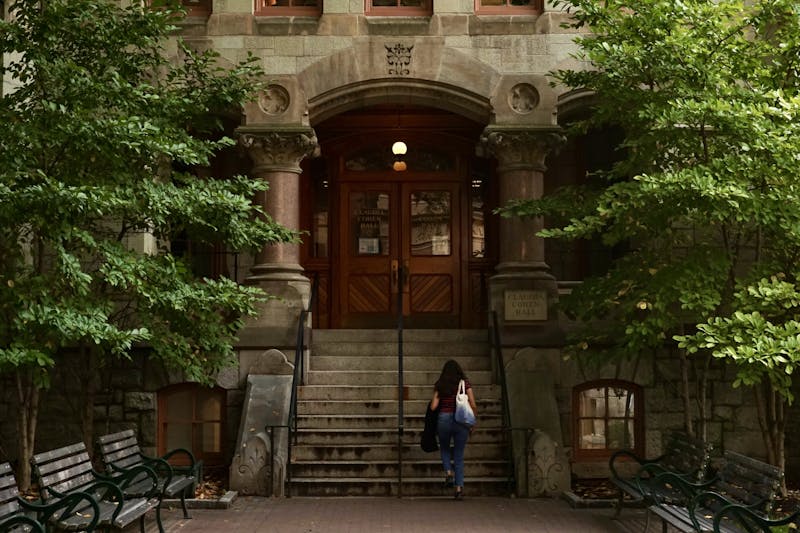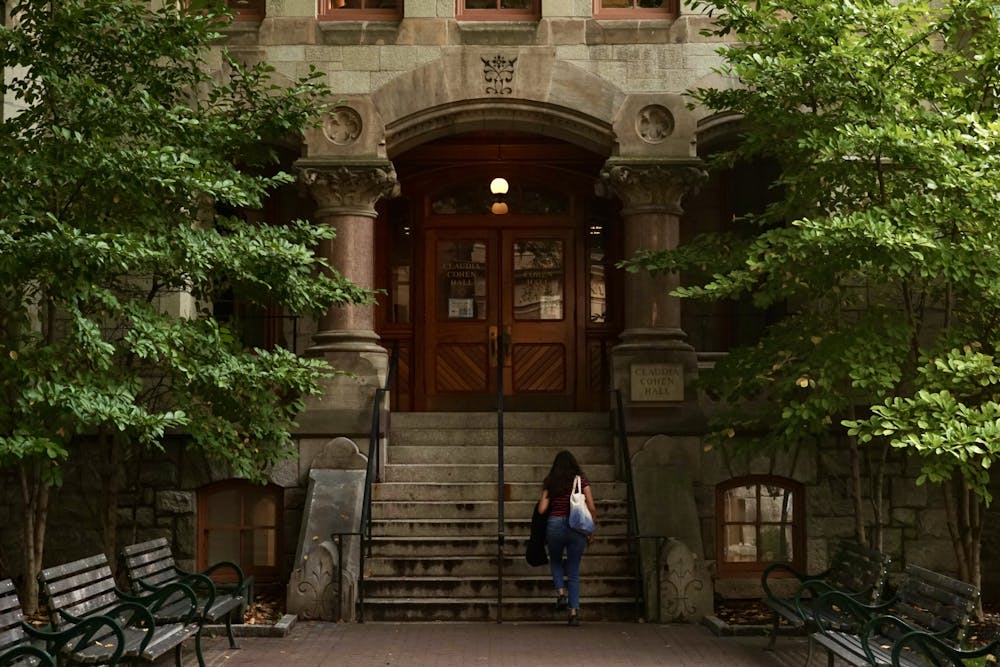Alumni and college admissions experts react after Penn removed the alumni interview from its admissions process.
Credit: Roger Ge
On July 16, Penn announced that its 2025-26 undergraduate admissions process would no longer include conversations with alumni, sparking mixed reactions from members of the Penn Alumni Ambassador Program.
Vice Provost and Dean of Admissions Whitney Soule and Senior Associate Vice President for Alumni Relations Hoopes Wampler announced the change in response to growing applicant numbers and constructive feedback from alumni. The Daily Pennsylvanian spoke with higher education experts and former alumni interviewers about their experiences and hopes for the revised program.
1986 Wharton graduate Laurie Weingarten — who also serves as the president and chief educational consultant at One-Stop College Counseling — described the shift away from alumni conversations as an “end of an era” in an interview with the DP.
“People are mourning the loss of the interview program,” Weingarten said. “Even if [alumni] felt like it didn’t have that much weight, it was just a nice way to stay connected to Penn, and I think it was kind of nice for a lot of students.”
Weingarten, who spent more than two decades as an alumni interviewer, noted the “change in philosophy” within Penn Admissions that has recently reshaped the University’s undergraduate application process. She attributed the changes to the leadership of Soule, who entered Penn with “a different view” than former Dean of Admissions Eric Furda.
Weingarten pointed to the University’s pivot from alumni interviews to non-evaluative conversations for the 2023-24 admissions cycle.
“We went from Dean Furda having over 10,000 alumni interviewers, and the goal was to interview every single applicant,” Weingarten said. “Pretty soon after [Soule] arrived … Penn announced that they’re getting rid of the interviews and having alumni conversations.”
When the first change was made, Weingarten recalled uncertainty among alumni regarding the “purpose” of conversations.
“Everyone that I know quit the second year,” Weingarten added.
While she called the shift from evaluative interviews “confusing,” Weingarten emphasized that “one conversation can still change a student’s path.”
1980 College and Wharton graduate Leonard Bernstein — who chaired the interviewing committee for alumni across Philadelphia suburbs — also noted the value of conversations for both prospective students and the University.
“The admissions people always thanked us,” Bernstein said in an interview with the DP, adding that the response from Penn typically emphasized “how refreshing it is to see in-person reactions, and how that helped them in the very tough decisions.”
Weingarten recounted an interaction with a Penn admissions officer in which she described “the most incredible candidate ever.” The admissions officer remembered discussing the evaluation when making the decision to accept the candidate, which Weingarten told the DP “made [her] feel great.”
1997 College graduate Alyson Anderson similarly highlighted the “positive” elements of the program, writing in a statement to the DP that “the alumni conversations were always about building community for me.”
“It never felt as [if] the interviews or conversations had many implications on a student’s application status,” Anderson wrote. “However, I do think it gave some color and personality to the candidates.”
She added that even after the change, the conversations not only “helped to present Penn as a place where alumni happily stayed involved,” but also “aided in building the Penn community and breaking down boundaries for potential applicants to apply.”
Weingarten also emphasized that while “quality control” was a “major challenge” during the conversations, it allowed applicants to “learn about Penn” from a mentor figure.
“I’m kind of conflicted on whether Penn should have stopped or not,” Weingarten continued. “I think there were pros and cons.”
According to Wampler, Penn Admissions anticipated the wide range of reactions following the announcement.
“As you might expect with a long-standing and deeply valued volunteer experience, the responses span a spectrum — from disappointment and concern, to understanding, curiosity, and genuine enthusiasm about what’s next,” Wampler wrote in a statement to the DP.
Wampler wrote that alumni volunteers will now “support matriculating students through welcome outreach — typically in the form of a congratulatory phone call or email — offering encouragement, insight, and a warm introduction to the Penn community.”
He continued that “Alumni Relations has long been looking at creating a more intentional mentoring program to facilitate connections in the student and alumni community” and will “expand through the launch of a formal, campus-wide mentorship initiative in 2026.”
In an interview with the DP, 2001 College Graduate Brett Martz welcomed the possibility of a new program, adding that he would be “happy to serve and see how things develop.”
Martz, who has served as an alumni interviewer since 2013, said that “every one of these developments over the past couple of years made my job as an interviewer easier.”
“I’ll be involved to the extent that I can be involved,” he said, noting his hope that alumni and students will “substantial and meaningful” connections to make sure that the alumnus’ help is “useful for everybody and worth the students’ time.”
“I don’t think I’ll miss the evaluative aspect,” Martz said. “I liked it better as a conversation. I liked taking the pressure off.”
Martz emphasized that alumni interviewers having “any type of consequential impact on somebody’s admissions chances” can be “scary” for applicants.”
“You could have some grumpy gorilla — who knows?” he said.
Weingarten echoed Martz’s sentiment, explaining that “there wasn’t consistency among [interviews] because everyone’s getting a different interviewer, and some are fabulous and some are not.”
“Rather than continuing a model that reached some students and not others, we chose to reimagine our approach in a way that would better reflect our values and ensure a more consistent and inclusive student experience,” Wampler wrote.
The DP also spoke with Rachel York — an admissions counselor at IvyWise — who noted that she was “not surprised” by Penn’s decision to end alumni conversations, given that they are a “huge undertaking.”
Wampler also cited alumni feedback about “the purpose of their role” following the shift from interviews to non-evaluative admissions-season conversations.
“A recurring theme in the feedback was whether their efforts might be more impactful at a different point in the student journey, such as after a student has been admitted,” Wampler added. “As we began planning the future of the program, we focused on designing a model that better aligns alumni engagement with moments of greater relevance and connection.”
Instead of being limited to admissions season, the new program will connect alumni volunteers with students “throughout their time on campus,” according to Wampler. He wrote that PAAP’s goal was to make alumni and student connections more “purposeful, timely, and personal.”
York also described a growing “emphasis” on how universities “are preparing their students for careers.”
“I could see Penn taking the robust alumni network, and focusing it more on current Penn students,” York said. “I could see that as being something in the same vein of ‘we’re really trying to set our students up for success post-college life, professionally.’”
Weingarten similarly spoke to the change as representative of a larger shift in higher education.
“COVID hit … many schools dropped the interviews, and many have not gone back,” she said. “Among the Ivies, it’s kind of split.”
Columbia University has “stopped them permanently,” while Cornell University only kept them for the architecture school, and Brown University “stopped them but went to an optional video.”
Bernstein noted his “surpris[e]” that Penn discontinued the program because the University “had moved to the forefront of offering alumni interviews,” to an extent where “most universities didn’t or couldn’t come close.”
According to Weingarten, Stanford University, Georgetown University, and the Massachusetts Institute of Technology have also maintained interviews, while the University of Chicago “stopped [offering them] completely.”
In lieu of an interview or conversation, some schools have implemented a Glimpse video — a 90-second clip that students can complete for $22 — as part of the Common Application.
“So much of what’s shared in an application is very well thought out — with good reason,” York said. “We’re seeing a lot more using platforms like Glimpse, where you just talk about yourself or a topic.
Sign up for our newsletter
Get our newsletter, DP Daybreak, delivered to your inbox every weekday morning.
York said that Penn may decide to utilize a platform like Glimpse to allow applicants to show more personality.
She cautioned, however, that “when Penn switched from interviews to conversations, there was a huge dropoff in alumni participation.”
“I could see that trend continuing here,” she said.
The Daily Pennsylvanian is an independent, student-run newspaper. Please consider making a donation to support the coverage that shapes the University. Your generosity ensures a future of strong journalism at Penn.

